Unwanted Child: Oregon and the 14th Amendment
By George T. Nicola
Last updated March 17, 2018
As an Oregon LGBTQ (lesbian, gay, bisexual, transgender, or queer) historian, I am fascinated by the details of the US Constitution’s 14th Amendment in Oregon, including the unique effect it has on certain minitories, such as the sexual minorities of my community. I am writing this article to commit some of those thoughts to writing.
- Oregon’s founding
- The 14th Amendment
- Additional benefits of the amendment
- Sisters take on Oregon’s KKK
- Bill McCoy and the rescue of the 14th Amendment
- Additional applications of the amendment’s clauses
From the beginning, Oregon was often a state of contradictions. Its constitution forbade slavery but at the same time forbade black people from moving here. (https://storywall.osbar.org/1638-1899/) It was around that time that the U.S. Supreme Court issued the Dread Scott decision that ruled that no African American could be a United States citizen. (https://www.britannica.com/event/Dred-Scott-decision)
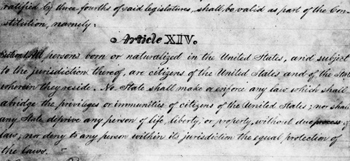 When the Civil War ended, Oregon eagerly ratified the 13th Amendment to the U.S. Constitution to abolish slavery. But without citizenship, African Americans would have few rights. So, people in control of the federal government tried to pass the 14th Amendment to guarantee the free Blacks would have U.S. and state citizenship. It stated, “All persons born or naturalized in the United States, and subject to the jurisdiction thereof, are citizens of the United States and of the state wherein they reside.” (https://www.law.cornell.edu/constitution/amendmentxiv)
When the Civil War ended, Oregon eagerly ratified the 13th Amendment to the U.S. Constitution to abolish slavery. But without citizenship, African Americans would have few rights. So, people in control of the federal government tried to pass the 14th Amendment to guarantee the free Blacks would have U.S. and state citizenship. It stated, “All persons born or naturalized in the United States, and subject to the jurisdiction thereof, are citizens of the United States and of the state wherein they reside.” (https://www.law.cornell.edu/constitution/amendmentxiv)
Oregon ratified the amendment on September 19, 1866. (https://en.wikipedia.org/wiki/Fourteenth_Amendment_to_the_United_States_Constitution) With that and with the ratification from the required number of other states, on July 28, 1868, US Secretary of State Seward issued his official proclamation certifying the ratification of the 14th Amendment. (https://en.wikipedia.org/wiki/Fourteenth_Amendment_to_the_United_States_Constitution) This effectively negated Oregon’s racial exclusion laws.
However, a new Oregon Legislature was voted into office the following year. It included more Democrats than the previous session. At the time, the Democratic Party was hostile to racial justice. Claiming that the some of the Republicans from the previous session were not legally elected, the new Legislature rescinded Oregon’s ratification of the 14th amendment on October 16, 1868. (http://proxy.multcolib.org:2084/resources/doc/nb/image/v2% 3A11A73E5827618330%40EANX-NB-130EE74F723ADC84% 402441714-130D1B1394A6FE8D%4029-130D1B1394A6FE8D%40?p=AMNEWS&hlterms=14th%3B+amendment%3B+mccoy ) But the action did not have the desired intent since the amendment was already part of the US Constitution. Still, that deratification remained there for over a century, like an unwanted child, until Oregonians finally decided to remove it.
The 14th Amendment also included two clauses which would eventually have an enormous influence on the human rights of all races in the United States – one on due process, the other on equal protection. These stated, “No state shall make or enforce any law which shall abridge the privileges or immunities of citizens of the United States; nor shall any state deprive any person of life, liberty, or property, without due process of law; nor deny to any person within its jurisdiction the equal protection of the laws.”
Through a number of federal court decision, these clauses would eventually have the effect of guaranteeing certain basic legal rights on the state and local level.
But Oregon’s advance and retreat pattern became erratic in the 20th and 21st Centuries. In the process of struggling for advancing human rights and equality, various actions were initiated in Oregon that had a long-term effect on the national level.
In the 20th Century, Oregon pioneered a series of direct democracy instruments which came to be called the Oregon System. “The Oregon System" refers to the use of direct democracy instruments such as the initiative and referendum, populist lawmaking tools. The initiative allows citizens to initiate state or local legislation, while a referendum allows voters to retain or rescind laws passed by a public legislative body. (http://www.encyclopedia.com/history/dictionaries-thesauruses-pictures-and-press-releases/oregon-system) While these processes brought about a lot of progressive reform, they sometimes made it easier for a majority to deprive a minority of equal rights. The federal 14th Amendment eventually helped curb some of the excesses the direct democracy brought about – the denial of a minorities’ human rights by the actions of the majority.
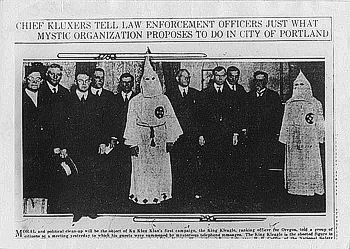 In 1922, a powerful coalition successfully promoted a ballot initiative called the Compulsory Public School Attendance Bill. The bill was an initiative to amend the Compulsory Education Act that compelled children between the ages of eight and sixteen to attend public schools. Inaugurated by the Scottish-rite Masons of Oregon, the initiative measure appeared on the November 7, 1922, Oregon ballot.
In 1922, a powerful coalition successfully promoted a ballot initiative called the Compulsory Public School Attendance Bill. The bill was an initiative to amend the Compulsory Education Act that compelled children between the ages of eight and sixteen to attend public schools. Inaugurated by the Scottish-rite Masons of Oregon, the initiative measure appeared on the November 7, 1922, Oregon ballot.
Proponents of the measure—including the Ku Klux Klan and the Federation of Patriotic Societies—believed that the measure was necessary to preserve and perpetuate a homogeneous American culture. The bill would have effectively eliminated most Catholic grade schools and high schools.
Opponents argued that the measure not only violated constitutionally guaranteed property rights but also posed a threat to religious freedom and the ability of parents to educate their children in accordance with their faith and conscience. Those most opposed to the measure were Roman Catholics, the initiative’s main target, and Seventh-Day Adventists, Episcopalians, and Lutherans—religions that operated private schools. The initiative passed.
The Catholic Archdiocese of Portland sued in U.S. District Court and won. Oregon appealed to the US Supreme Court and once again the Catholics and their allies won. In the Pierce v. Society of sister, the U.S. Supreme Court for the first time applied the U.S. 14th Amendment to protect individual rights. (https://oregonencyclopedia.org/articles/pierce_vs_society_of_sisters_1925_/#. WlRUQUxFyUk)
In this case, the principle came to be called “substantive due process” and was based on that due process clause of the 14th Amendment. “Substantive due process is the notion that due process not only protects certain legal procedures, but also protects certain rights unrelated to procedure.” (https://www.law.cornell.edu/wex/substantive_due_process) Eventually, the amendment’s equal protection would be added to this tool kit so that almost all the US Bill of Rights (the first 10 amendments) would be applied to state and local government. Initially, all of those applied only the federal level. In other words, the federal government could not restrict religious freedom or free speech, but the states could. These extensions of human rights were possible only the 14th amendment which Oregon had at one time rejected.
So here was an early instance of using the 14th Amendment to protect the rights of minorities when their rights were threatened by the whim of the majority. This precedent was cited in many other similar cases which protected civil liberties and civil rights. Eventually, it was combined with the equal protection clause to expand human rights substantially.
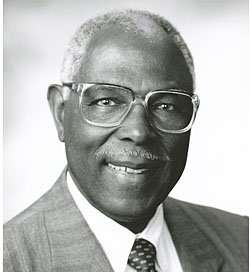 In 1972, North Portlanders voted to the Oregon House Bill McCoy. Bill was the first African American to serve in the Oregon Legislature. Just two years earlier, his wife Gladys McCoy was elected to the Portland school board, becoming the first African American to hold Oregon public elective office.
In 1972, North Portlanders voted to the Oregon House Bill McCoy. Bill was the first African American to serve in the Oregon Legislature. Just two years earlier, his wife Gladys McCoy was elected to the Portland school board, becoming the first African American to hold Oregon public elective office.
Gladys was also one of the first straight cisgender allies to what would become Oregon’s LGBTQ movement. She started supporting us in 1972 when she worked on the National Democratic Party’s National Convention platform. The following year, I wrote and lobbied for House Bill 2930, Oregon’s first attempt to ban sexual orientation discrimination. Bill McCoy was one of its sponsors. Although HB 2930 failed House passage by two votes short of a majority, it represented the evolution of local Oregon LGBTQ efforts into a statewide movement.
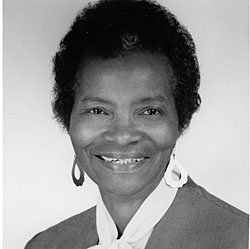 But Bill McCoy’s crowning achievement came before that. On April 19, 1973, McCoy testified before the Senate State and Federal Affairs Committee in support of his proposal for Oregon to reratify the 14th Amendment to the U.S. Contribution. The meeting minutes note that although McCoy “realized that ratification at this time has no real effect on what has been done constitutionally, ... he wished by passage of HJR 13 to set the Oregon record straight." House Joint Resolution 13 passed overwhelmingly on May 23, 1973. (http://proxy.multcolib.org:2084/resources/doc/nb/image /v2%3A11A73E5827618330%40EANX-NB- 130D853B050D9173%402441766-130D273E71192DC5%4018-130D273E71192DC5%40?p=AMNEWS&hlterms=14th%3B+amendment%3B +constitution)
But Bill McCoy’s crowning achievement came before that. On April 19, 1973, McCoy testified before the Senate State and Federal Affairs Committee in support of his proposal for Oregon to reratify the 14th Amendment to the U.S. Contribution. The meeting minutes note that although McCoy “realized that ratification at this time has no real effect on what has been done constitutionally, ... he wished by passage of HJR 13 to set the Oregon record straight." House Joint Resolution 13 passed overwhelmingly on May 23, 1973. (http://proxy.multcolib.org:2084/resources/doc/nb/image /v2%3A11A73E5827618330%40EANX-NB- 130D853B050D9173%402441766-130D273E71192DC5%4018-130D273E71192DC5%40?p=AMNEWS&hlterms=14th%3B+amendment%3B +constitution)
In 1996, after their deaths, the Oregon Legislature designated the Bill and Gladys McCoy as the “first African-American political family of Oregon,” calling them “modern-day pioneers who blazed the trail for members of the State’s African-American community.” More information on them can be found at http://glapn.org/6311mccoy.html.
A historic recent application of the amendment’s due process and equal protection clauses was the one that brought marriage equality to Oregon. In 2004, Oregon voters had passed Measure 36, an initiative that banned same gender marriage in Oregon.
About a decade later, two lawsuits were filed which sought to overturn those. Geiger v. Kitzhaber and Rummell v. Kitzhaber were filed in the U.S. District Court in Eugene, Oregon. They used the substantive due process and equal protection clauses of the 14 amendments to do that.
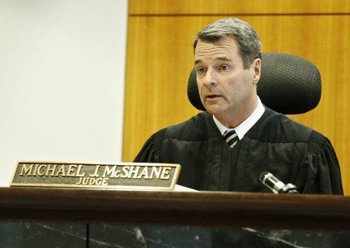 Judge Michael McShane (photo courtesy of oregonlive.com) combined the cases and eventually issued a ruling which agreed that they were violations of the 14th Amendment. Oregon same gender marriages started the same day. It was in his ruling that Judge McShane eloquently summed up the important of the 14th amendment in terms of individual rights: “At the core of the Equal Protection Clause, however, there exists a foundational belief that certain rights should be shielded from the barking crowds; that certain rights are subject to ownership by all and not the stake hold of popular trend or shifting majorities.” (http://media.oregonlive.com/politics_impact/other/OPINION.pdf)
Judge Michael McShane (photo courtesy of oregonlive.com) combined the cases and eventually issued a ruling which agreed that they were violations of the 14th Amendment. Oregon same gender marriages started the same day. It was in his ruling that Judge McShane eloquently summed up the important of the 14th amendment in terms of individual rights: “At the core of the Equal Protection Clause, however, there exists a foundational belief that certain rights should be shielded from the barking crowds; that certain rights are subject to ownership by all and not the stake hold of popular trend or shifting majorities.” (http://media.oregonlive.com/politics_impact/other/OPINION.pdf)
Important 14th Amendment dates:
- Oregon first ratified on September 19, 1866
- Incorporated into the US Constitution July 28, 1868
- Oregon rescinded ratification October 16, 1868
- Oregon re-ratified May 23, 1973
P.O. Box 3646 • Portland, OR 97208-3646 • info@glapn.org
Copyright © 2018, Gay & Lesbian Archives of the Pacific Northwest


